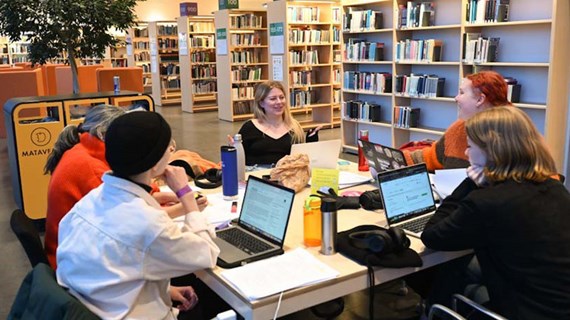We use cookies on this website. Cookies help us deliver the best experience on our website. Read about cookies.
-
- Student Services
- Student Services
-
- The Writing Centre and support for your studies
- The Writing Centre and support for your studies
- Take-home exams and written assignments
- Registration, certificates & administration
- Student Health Service
- Study Guidance
-
- Studying with a disability
- Studying with a disability
- Become a support person
On the page -
- Go International
- Go International
-
- Exchange studies
- Exchange studies
- Timeline for exchange studies
- Apply for exchange studies
- Admitted to exchange studies
- After your exchange
- Internship abroad
- Thesis abroad
- Certificate of International Merits
- Short-term international experiences
- Virtual International opportunities
- Contact for international opportunities
On the page -
- Jobs and internships
- Jobs and internships
-
- Innovation and entrepreneurship
- Innovation and entrepreneurship
- Leapfrogs
- Internship
- Your future career
- Graduation and alumni network
On the page
Apply for exchange studies
exchange studies
First application period ends in November. Apply online in MoveOn with study plan and supporting documents. See eligibility requirements, which places are available to you, and who you can contact.
Application periods
Autumn application period
10 October – 10 November. This application period is open for all exchange places for the next academic year (next autumn semester and the following spring semester).
Autumn application deadline: 12.00 (noon), 10 November
Spring application period – remaining places
10 February – 1 March. This application period is open for any remaining exchange for the next academic year. Offers in this round are limited.
Spring application deadline: 12.00 (noon), 1 March
Where to go
Malmö University has agreements with several hundred universities around the world. In the search portal, you can find out which countries and universities we work with. Filter your search to see which agreements are open for your faculty or department. Please note that all places will be advertised during the Autumn application period.
When to go abroad
Depending on the programme you are studying, there are different opportunities. To see what applies to you, look for your faculty or department in the list.
Culture and Society – Global Political Studies
- European Studies: semester 4 and 5
- International Migration and Ethnic Relations (Bachelor's): semester 5
- International Migration and Ethnic Relations (Master's): semester 3
- International Relations: semester 4, or 5 (Semester 4 is an elective semester and ideal for exchange studies. However, you can also use semester 5 for exchange. It is then recommended to select courses in an IR relevant field and on a similar academic level as the course In-Depth Studies in Global Politics.)
- Human Rights: semester 3 and 4
- Peace and Conflict Studies: semester 4 and 5
- Political Science: Global Politics (Master's): semester 3
Culture and Society – The School of Arts and Communication
- Interaction Design: semester 5
- Culture and Change – Critical Studies in the Humanities: semester 3
Keep in mind that for some of our partner universities, you need to compile a portfolio of your creative work. An academic coordinator will usually help you with this.
Culture and Society – Urban Studies
- Master's programme in Urban Studies: semester 3 (elective)
- Leadership and Organisation: Societal Challenges and Organisational Changes: semester 3 (elective)
- Urban Studies: Urban Business and Development – Real Estate and Transport: semester 3 (elective)
Education and Society (LS)
As a student at the Faculty of Education and Society, you have many opportunities to study abroad. One important prerequisite is that what you study abroad can be credited within your programme and that the courses are approved in advance by a head of the subject at the faculty.
Technology and Society (TS)
For students at bachelor level there are exchange studies available for all programmes. Check your programme syllabus to see which semester is best for conducting exchange studies.
For students at master’s level, it might be possible to study abroad. Contact the international coordinator if you are interested.
Check eligibility
Before starting your application, make sure that you fulfil all the eligibility requirements.
Eligibility requirements
To qualify for applying for exchange studies, you must:
- have completed at least one year of full-time studies at Malmö University (60 credits) upon departure.
- be an active student at Malmö University at the time of the application.
- at the time of the application, have completed at least 75 per cent of the studies for which you have been registered for during the previous semester, unless there are specific reasons why this has not been achieved.
- at the time of application to the host university (after being nominated by your faculty), have completed all courses you were registered for during the previous semester. Please note, this requirement varies between faculties.
- present a study plan containing courses amounting to full-time studies, corresponding to 30 higher education credits, that can be accredited towards a degree at Malmö University.
- have adequate language proficiency in English, or in the language in which the teaching is conducted. The requirements for each university can be found in the call for applications in the MoveOn portal. Find more information about language requirements in the section Supporting documents.
Application
For students at Malmö University, the application for exchange studies is open twice a year. All exchange places will be available during the Autumn application period. Any remaining places will be offered during the Spring period.
Apply online in MoveOn
Recommended web browsers for using MoveOn forms are Google Chrome, Microsoft Edge and Firefox. Log in to the MoveOn portal with your computer identity and password.
Choose your faculty and department to find available exchange places for you. You can choose up to four universities.
You can start your application, save it and update it later. Note the application deadline, since late applications will not be considered. Your application should be written in English.
The completed application includes
- Study plan (to be filled in online)
- Supporting documents:
- CV
- Statement of purpose
- Documents that support your language skills
When you are satisfied with your digital application you need to save and 'submit' the application. After submission, you will receive an automated email receipt with your full application as a PDF attachment. Please make sure you have received this PDF and contact us in case you haven't.
Study plan
List the courses you want to study
The Study plan shows which courses you want to study. You must complete a Study plan for each university you are applying to, so if you apply to three universities, you then make three different Study plans.
Check out the host university's course offerings
Finding the courses/subjects offered usually takes some time. Try searching for the name of the university + 'fact sheet' to find the course offerings, or look for keywords like ‘inbound/incoming exchange’ and ‘units/subjects/courses/modules’. Sometimes you must click on a programme to find the courses.
You are to find courses, equivalent to 30 higher education credits, that can be related to your education. However, the course choices that you specify in your application are not absolute, since many universities will not have future course information available at this point. In that case, use the course catalogue for the current academic year to find examples of what you would like to study.
Testimonies
Find out what previous students thought about the university you are interested in. You can find evaluations from previous exchange students in our database of partner universities.
Search for a partner university in the MoveOn portal
Exchange outside of Europe?
To see how many credits you need to study at the host university in order to reach the equivalent of full-time studies (30 higher education credits), check the list of partner universities outside of Europe.
Supporting documents
1. Statement of purpose
In your 'Statement of purpose' it is important that you explain the choice of courses. This personal letter should be limited to one A4 page, font size 10–12 with single spacing.
In the letter:
- explain why you want to study the courses you have chosen and motivate how they relate to your studies at Malmö University and your interests.
- reflect on how the exchange will develop you both academically and personally.
- justify your choice of all universities, explaining why you have chosen your alternatives.
- describe in what way you hope that the exchange period will relate to your future profession.
- describe why you are a good ambassador for Malmö University.
Write only one letter per application, not one per university you are applying to. The letter should be written in English if the classes you intend to take are taught in English. If classes are held in another language, you should write the letter in that language and attach an English translation.
2. CV
Your CV should contain relevant education, work experience and other relevant activities. A portrait photo is optional. It should be written in English and be no longer than one A4 page.
You should not attach grades, work certificates or similar documents that prove your CV. It will be requested if required.
3. Documents that support your language skills
At some universities there are language requirements that you need to meet to be admitted. Please note, some universities require your merits to be recently awarded. Find more about which documents are required for each partner university in the MoveOn portal.
- If the partner university ask for your upper secondary grades, please include these in your application.
- In case the partner university requires you to take an official language test, please note that you do not need to submit a test result in the application (if you do not already have a valid test result). However, you will need to explain in your application when you will take the language test, after you have been nominated for exchange studies.
4. Study description (only if you are studying freestanding courses)
If you are studying freestanding courses, you must attach a study description which describes how you plan to graduate from Malmö University, and how your exchange semester fits into your future degree.
Find support

The Writing Centre is here to guide you with your writing tasks and answer questions about texts and language.
Assessment of applications
If there are more applications than the number of available exchange placements, the applications will be compared and assessed. Academic qualifications and course choices will be reviewed, as well as the Statement of purpose together with language skills. The assessment criteria are, in no particular order:
- academic merits
- personal motivation and suitability
- language skills
- choice of courses and possibilities for credit transfer.
Studies on your own
If you do not find a suitable university among the University's partner universities, you can apply for studies abroad on your own. Planning your studies abroad gives you a lot of independence but it also requires a lot of effort from you. You must organise everything yourself, such as contact with the university, course selection and visa.
Planning for studies abroad on your own
There are some important things to consider when planning your studies abroad on your own.
- You must find out all the facts about the university yourself and apply on your own as an ‘international fee-paying student’ (or ‘free mover’).
- You must often pay tuition fees (which you do not have to do if you go as an exchange student through Malmö University).
- No credit transfers are assessed or guaranteed in advance. If you wish to apply for a credit transfer, you must do so after completing the courses abroad, using a specified form together with the transcript of records.
- You must arrange your own visa, accommodation, insurance and other practical matters.
Financial aid
If you are eligible for student financial aid and wish to apply for it, then you need to check whether the foreign university you wish to attend is recognised or under government supervision. You need to find out what the education is worth and whether it qualifies for student financial aid.
Upper-secondary school transcript
A template for translation into English can be found on the website of the Swedish National Agency for Education. If you need a certified translation of your transcript, you can search the website of the Legal, Financial and Administrative Services Agency for certified translators. Never send your original transcript. If you need a certificate showing that you are eligible for university studies, you can obtain one from the Swedish Council for Higher Education.
Application
Contact the university directly and ask for information and application documents. Some countries have central admissions processes and others want you to apply directly to the university. The procedure can also vary within a country. You must ensure that you are eligible for the courses you plan to study and have sufficient language skills.
Be careful when filling out your application. An application that is not correct may be sorted and discarded immediately.
Private recruiters and advisors
A number of private institutions recruit students to universities abroad. They know their universities and usually help with the application process and related matters free of charge because they are funded by the universities to which they recruit students. This means that you will have to pay tuition fees at ‘their’ university. If you are interested in these institutions, you must seek them out yourself.
Contact us
If you have questions about your application or supporting documents, contact the international administrator at your faculty or department.
Faculty and department contacts
-

Katarina Wingkvist - International liaison officer
Health and Society
katarina.wingkvist@mau.se
+46 40 665 88 70
-

Marie Väfors Fritz - Senior lecturer
Department of Criminology
marie.vafors.fritz@mau.se
+46 40 665 78 29
-

Maria Wennerberg - International liaison officer
Department of Global Political Studies
maria.wennerberg@mau.se
+46 40 665 71 34
-
SJ
Sofia Johansson - International liaison officer
The School of Arts and Communication, Urban Studies
sofia.johansson@mau.se
+46 40 665 70 16
-

Caroline Morand - International liaison officer
Education and Society
caroline.morand@mau.se
+46 40 665 70 18
-

Vilhelm Engström - International liaison officer
Technology and Society
vilhelm.engstrom@mau.se
+46 40 665 70 04



